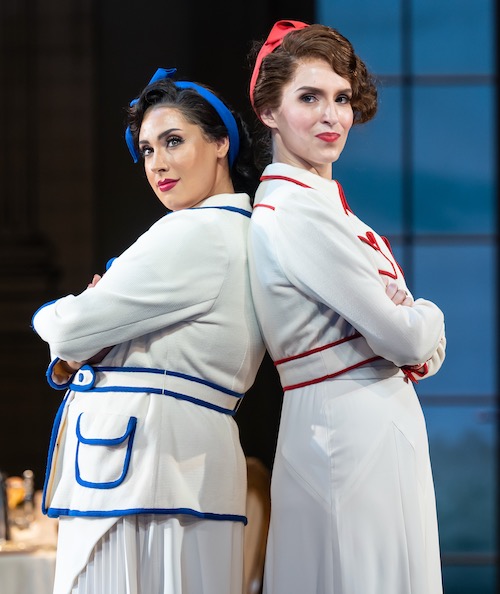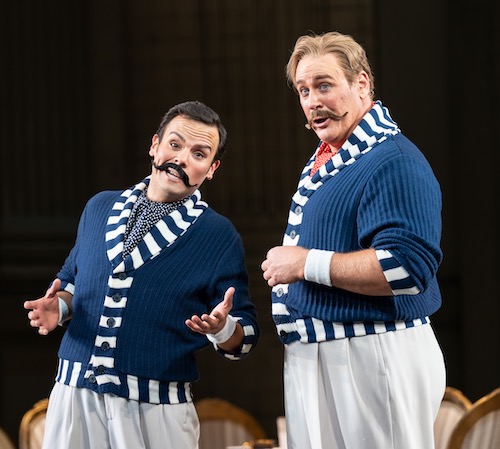Dallas Opera brings out the comedy and emotional depth of Mozart’s “Cosí fan tutte”

Despite the parody and irony of Lorenzo da Ponte’s libretto, Mozart takes his characters’ emotions seriously in Cosí fan tutte. This opera buffa is one of tragic beauty, musically transparent, harmonious, and perfectly proportioned.
The Dallas Opera’s performance of the work Wednesday night at the Winspear Opera House saw the confluence of these two elements—the farcical libretto and thoughtful score—set in a gorgeous equilibrium.
Premiered in 1790, Cosí tells the tale of two young officers Guglielmo and Ferrando and their recently betrothed—sisters Fiordiligi and Dorabella, respectively. When the two officers boast of their sweethearts’ fidelity and constancy, a friend and older gentleman Don Alfonso raises objections on the grounds that all women are eventually the same—fickle and untrustworthy. (The opera’s title translates from Italian as, “So do they all.”)
A 24-hour wager is struck between them, and Don Alfonso sets in motion an elaborate ruse to test the women’s faithfulness. Guglielmo and Ferrando tell their partners that they’ve been called off to war—per Alfonso’s scheme—and return in disguise as strangers to woo the now forlorn sisters. Don Alfonso enlists the help of the ladies’ plucky maid Despina, who, experienced in worldly matters, encourages the young women to explore their most deeply repressed desires.
In the ensuing chaos of the game, the couples end up oppositely paired, until, at a hastily arranged double wedding, the truths of the plot are revealed.
The unique quality of Cosí fan tutte among Mozart’s operas is found in the symmetry of da Ponte’s libretto, expertly portrayed through director Michael Cavanaugh’s dynamic, almost Baroque-style staging—the couples’ fluid pairing often splits the stage into discernibly varied degrees of emotional ambiguity, with puppet-masters Don Alfonso and Despina pulling the strings from center.
When not set in the strict rigidity of this chessboard, the action unfolds in charming buffoonery that traverses the stage more freely. It is a notably impressive accomplishment of this production that each member of the cast managed an astute command of well-timed physical comedy, all the while never compromising the music and avoiding ham-handedness.
The well-to-do Fiordiligi and Dorabella, portrayed by soprano Caitlin Gotimer and mezzo-soprano Kayleigh Decker, respectively, struck an exhilarating blend. Harmonies was consistent and balanced, and each of their character portrayals complemented the other’s with convincing effect.
As the more resolute of the two sisters, Gotimer’s warm and sturdy low-end gave Fiordiligi a sense of maturity and steadfastness. Though, effortless flexible, Gotimer was equally consistent in the higher reaches of her range. Her unyielding rendition of “Come scoglio” alternated muscular intervallic passages and lithe coloratura, all with exhilarating spin.
Decker’s Dorabella matched her colleague-sibling in presence, with an enticingly bright lilt emphasized through the more lyrical passages. “E amore un ladroncello” was a delightfully playful interpretation, replete with emotive inflections and phrasing.

As their overconfident foils, Lucas Meachem and David Portillo portrayed Guglielmo and Ferrando, respectively, with perceptible familiarity and a sense of comeraderie. Their endearing bromance, distinguished by acutely timed slapstick antics, was made vivid through Portillo’s silvery tenor and Meachem’s hardy baritone.
Meachem’s “Donne mie la fate a tanti” was at once imposing and cheeky, robust in tone and resonance and biting with diction, with a faint sense of levity reminiscent of Gilbert & Sullivan patter. Portillo offered a gorgeous rendition of Ferrando’s heartbreaking aria, “Un’aura amorosa” near the close of Act I. Thoroughly elastic, his tone gleamed affectionately at the top, and his demonstration of dynamic control yielded an undeniable vulnerability to the role.
Soprano Diana Newman as Despina was a theatrical standout in this cast. Vocally, she shimmered brilliantly in the high extensions with a soubrette tone, though she was often lost in the lower reaches. Still, her vocal manipulations proved acts of comedic genius as she switched from one zany disguise to another. Baritone Rod Gilfry’s Don Alfonso was an exemplary basso buffo. No stranger to the style, Gilfry interpreted the character’s hefty passages with appropriate weight and surprising agility.
This production, on loan from the San Francisco Opera, sets the action in a bourgeois American country club circa late-1930s. Constance Hoffman’s costume designs set vibrant color blocking and playful patterns against neoclassical architecture and furnishings from Erhard Rom’s set and projection design. Together with Justin Partier’s revival of Jane Cox’s original lighting design, the stage becomes an invitingly immersive setting of locker rooms, a swanky club parlor, and a tree-lined swimming pool.
Conducted by Elizabeth Askren, the TDO orchestra provided delicate accompaniment, effectively layered around the vocalists rather than under them. The TDO chorus performed smartly, though the final performance would benefit from a better blend in the tenor section.
The final performance of Cosí fan tutte takes place 7:30 p.m. Saturday. dallasopera.org